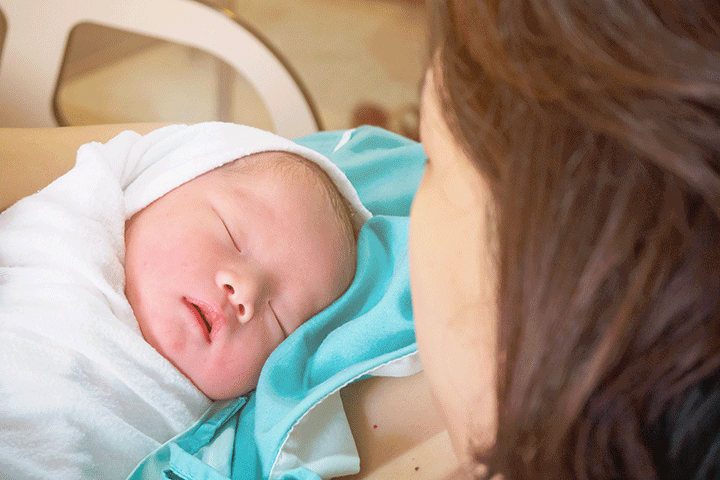Pregnancy Care
Hypothyroidism and Pregnancy: Everything You Need to Know

What Is Hypothyroidism?
Hypothyroidism is a condition in which your thyroid gland produces insufficient amount of thyroid hormones. The thyroid gland is a butterfly-shaped organ located in the front of your neck, wrapped around your windpipe. It is part of the endocrine system responsible for producing essential hormones, such as thyroxine (T4) and triiodothyronine (T3), that regulate your body’s metabolism and vital processes. These hormones control how the body uses and stores energy, and hence, an insufficient amount of hormones can make you feel tired. Hypothyroidism should not be confused with HYPERthyroidism which is when a person makes too much thyroid hormone.
Hypothyroidism may develop during pregnancy, which can be a cause for concern, especially for the baby.
What Causes Hypothyroidism?
In approximately 95 percent of cases, hypothyroidism is due to a problem in the thyroid gland itself and is called primary hypothyroidism. The most common cause of primary hypothyroidism is Hashimoto’s thyroiditis, an autoimmune disorder where your body’s antibodies mistakenly attack your thyroid glands. This results in an underactive thyroid where hormone production is significantly reduced. Certain medications and diseases can also decrease thyroid function, for example, hypothyroidism can develop after medical treatment for hyperthyroidism, such as thyroidectomy (surgical removal of the thyroid) or radioactive iodine treatment (to destroy thyroid tissue).
In a small proportion of cases, hypothyroidism can arise due to decreased production of thyroid stimulating hormone (TSH) by the pituitary gland and it is called secondary hypothyroidism.
What Are the Symptoms of Hypothyroidism?
The symptoms of hypothyroidism vary widely, some people have very mild symptoms, even going undetected while others have dramatic symptoms, or, rarely, life-threatening symptoms. The symptoms of hypothyroidism can be non-specific and many patients with mild hypothyroidism are identified on screening tests.
Some of the common symptoms of hypothyroidism may include:
- Fatigue
- Weight gain
- Constipation
- Muscle cramps and weakness
- Inability to tolerate cold temperatures
- Slower heart rate
- Dry and coarse skin
- Loss of lateral eyebrows
- Swollen neck or face or around the eyes
- Hoarse voice
- Sleep apnoea
- Menstrual irregularities
It is crucial to seek medical attention and undergo a proper diagnosis if you experience any of the symptoms and have any concerns.
Hypothyroidism in Pregnancy
The range of symptoms of hypothyroidism during pregnancy is similar to those that occur in a nonpregnant person, and some of the symptoms can easily be overlooked or attributed to the pregnancy itself. Where iodine nutrition is adequate, the most common cause of hypothyroidism diagnosed during pregnancy is autoimmune (Hashimoto’s) thyroiditis.
How Can Hypothyroidism Affect Me and My Baby?
Hypothyroidism is known to increase the risks of a miscarriage and has been associated with other pregnancy complications such as preeclampsia and gestational hypertension, placenta abruption, preterm delivery and postpartum haemorrhage (bleeding).
However, hypothyroidism not only affects your body. It can also cause significant harm and long-term complications to the baby. It can cause abnormal heart rate in the baby and low birth weight. Thyroid hormones are vital for a baby’s brain development, and your baby relies on you for thyroid hormones until their thyroid glands develop and start to function (this typically begins near the end of the first trimester of pregnancy).
If your hypothyroidism is not treated, there is a chance that your child may be born with congenital hypothyroidism, which can lead to severe developmental, cognitive and neurological deformities. In the case of severe hypothyroidism, your baby’s brain development may also be affected, and they may experience intellectual abnormalities and delayed growth.
How Is Hypothyroidism Diagnosed?
A physical examination will likely be conducted initially to check for signs and symptoms of hypothyroidism such as a swollen neck, muscle weakness or weight gain. To further confirm the diagnosis, blood tests may be performed to measure thyroid hormone (T4 and T3) and thyroid-stimulating hormone (TSH) levels. A low thyroid hormone and high TSH level signifies an underactive thyroid.
Additionally, thyroid antibodies may be checked as raised antibodies may suggest an autoimmune cause such as Hashimoto’s thyroiditis, which is a common cause of hypothyroidism.
What Are the Treatment Options?
The goal of treating hypothyroidism is to replace the amount of thyroid hormone that is lacking so that there is sufficient amount of hormones in the body for optimal metabolic functions. This typically involves taking thyroid hormone replacement pills such as levothyroxine, which is similar to the T4 hormone that your thyroid glands produce. The medication will need to be taken everyday and for most people with hypothyroidism, they will need to take thyroid pills for the rest of their life. Never change the dose of thyroid hormones on your own as too much thyroid hormones can cause heart rhythm problems and even damage your bones.
In pregnancy, thyroid hormone requirement usually goes up to accommodate for the requirement of the pregnancy and baby. As your thyroid hormone levels usually fluctuate during the different stages of pregnancy, it is crucial that you test for thyroid hormone levels every 4 weeks during the first half of your pregnancy to allow for your endocrinologist to prescribe the appropriate dosage amount.
However, take note that thyroid hormone medications should not be consumed together with prenatal vitamins as the minerals can impede the absorption of thyroid hormones. In general, thyroid hormone pills should be taken on an empty stomach, 30min to an hour before food or supplements.
Conclusion
Although hypothyroidism cannot be prevented, you can still control and alleviate complications by getting diagnosed early, especially in your pregnancy, and following your doctor’s prescribed treatment. As such, it is critical to identify the possible symptoms of hypothyroidism as soon as possible.
Read this next ...
WHO WE ARE
About SOG Health Pte. Ltd.
Established in 2011, SOG Health Pte. Ltd. (“SOG”) is a leading healthcare service provider dedicated to delivering holistic health and wellness services to the modern family.
With a long and established track record in Singapore providing Obstetrics and Gynaecology (“O&G”) services such as pre-pregnancy counselling, delivery, pregnancy and post-delivery care, the Group has since further expanded its spectrum of healthcare services to include Paediatrics, Dermatology, and Cancer-related General Surgery (Colorectal, Breast & Thyroid).
The Group’s clinics, under its four operating segments of O&G, Paediatrics, Oncology and Dermatology, are strategically located throughout Singapore to provide easy access to its patients.
- Obstetrics
- Gynaecology
- GynaeOncology
- Breast, Thyroid & General Surgery
- Colorectal, Endoscopy & General Surgery
- Dermatology
- Paediatrics
Consult With A Specialist From SOG
Visit one of our specialists today to learn more about your health!
Recommended Specialists
Book An Appointment
Fill up this form and our clinic will get back to you shortly.
For general enquiries, please click here.








